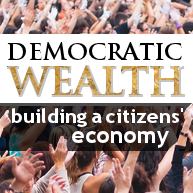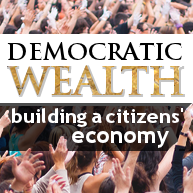
‘An Iron Chain of Bondage’: Lessons from the Knights of Labor
As modern workers, we have much to learn from the rich tradition of labour republicanism in America. The second piece in our Democratic Wealth series, hosted with OurKingdom. In 1828, William Heighton, a radical shoemaker, announced to a group of Philadelphia labourers that the wage-labour system “is…an iron chain of bondage. A system of unjust abstraction, oppression, and legal fraud, by which the most useful classes of society are drained of their wealth, and consigned over to eternal toil and never-ending slavery.” Heighton had just created the first formal political party of workers in modern history, the Working Men’s Party of Philadelphia.

Democratic wealth: Exploring ideas for a citizens’ economy
Could republicanism provide the model for a political economy that belongs to us all and works for the common good? OurKingdom and Politics in Spires’ new series explores this question, introduced here by its editor.
The past two decades or so have seen a renewal of interest within academic political theory in something, or some things, called ‘republicanism’. As a tradition (or set of traditions) within political theory, republicanism is not going to give us a direct handle on, say, the details of monetary and fiscal policy. But it can perhaps provide a constructive basis for thinking about what we fundamentally want from an economic order and about some of the institutions or approaches that will promote these goals.

Democratic Wealth
In 2008, when the economic crisis hit, many expected the demise of ‘neoliberalism’ as the reigning economic philosophy. Yet four years on, there are still few alternatives on offer. New citizen movements, such as the indignados in Spain and Occupy movements in London, New York and elsewhere, have articulated a need for an alternative. In this series, we will explore how republicanism – and republicans – might help achieve this.









